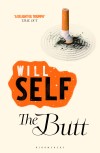One of the first reviews of Liver, from Time Out.
Liver
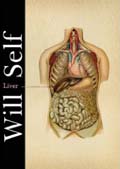
Liver – Will Self
![]()
![]()
See all books by Will Self at
Amazon.co.uk | Amazon.com
Synopsis:
These remarkable new pieces from Will Self each feature the largest of our internal organs: the liver, in varying states of disease and decay. In “Foie Humane” we go inside a Soho drinking club, the denizens of which live in a highly stylised yet emotionally dead state of excess. “Prometheus” tells the story of a dazzlingly successful advertising copywriter who can sell anything to anyone at any time. But things go wrong when he meets Zeus, a bigshot entrepreneur with a beautiful and manipulative wife. Tony Phillips’ subterranean Kensington flat is the setting for “Birdy Num Num,” where obsessives spend their days in a crepuscular realm of cocaine and heroin. Finally, in “Leberknodel’, a terminal liver cancer patient travels to Zurich to commit assisted suicide. When she arrives, however, the cancer mysteriously goes into remission.
Garment District
Read Will’s latest Necessary Steps column in the New York Times.
26.08.08
The Butt
Synopsis:
Tom Brodzinski is a man who takes his own good intentions for granted. But when he finally decides to give up smoking, a moment’s inattention to detail becomes his undoing. Flipping the butt of his final cigarette off the balcony of the holiday apartment he’s renting with his family, Tom is appalled when it lands on the head of one his fellow countrymen, Reggie Lincoln. The elderly Lincoln is badly burnt, and since the cigarette butt passed through public space before hitting him, the local authorities are obliged to regard Tom’s action as an assault, despite his benign intentions. Worse is to follow: Lincoln is married to a native from one of the rigorous, mystical tribes of the desert interior, and their customary law is incorporated into the civil statute.In order to make reparations to Mrs Lincoln’s people, Tom will have to leave his family behind, and carry the appropriate goods and chattels deep into the arid heart of this strange, island continent. Any of this might be bearable, were it not for Tom’s companion, forced on him by his enigmatic lawyer, the mixed-race Jethro Swai-Phillips.
Brian Prentice, like Tom, has to make reparations and although there is a taboo that prevents either man from knowing the exact detail of the other’s offence, Tom’s almost 100 per cent certain that he’s a child-abuser. As they drive into the desert and encounter a violent counter-insurgency war that Tom has allowed himself to remain in ignorance of, the relationship between the two men becomes one of complicit guilt as well as seething mistrust. Refusing facile moral certitudes, Will Self’s latest novel is set in a distorted world, in a country that is part Australia, part Iraq, part Greeneland and part the heart of a distinctively modern darkness.
Psychogeography
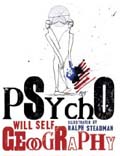
Psychogeography – Will Self
![]()
![]()
See all books by Will Self at
Amazon.co.uk | Amazon.com
Synopsis:
Provocateurs Will Self and Ralph Steadman join forces in this post millennial meditation on the vexed relationship between psyche and place in a globalised world, bringing together for the first time the very best of their “Psychogeography” columns for the “Independent”. The introduction, ‘Walking to New York’, is both a prelude to the verbal and visual essays that make up this extraordinary collaboration, and a revealing exploration of the split in Self’s Jewish American British psyche and its relationship to the political geography of the post 9/11 world. Ranging from the Scottish Highlands to Istanbul and from Morocco to Ohio, Will Self’s engaging and disturbing vision is perfectly counter pointed by Ralph Steadman’s edgy and beautiful artwork.
Foreword to Nick Cave: The Complete Lyrics
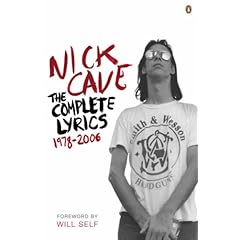
The Complete Lyrics – Nick Cave
![]()
![]()
See all books by
Nick Cave at
Amazon.co.uk
Amazon.com
Will Self’s Foreword to Nick Cave: The Complete Lyrics
Some 20 years ago, I had a long wrangle with the music writer Barney Hoskyns about the relative virtues of rock lyricists. Barney’s view was (and I hope I’m not traducing him in any way) that simplicity was the key. The structure of pop songs – most of which derive from the holy miscegenation of the English ballad form and the eight-bar blues – the importance to them of melody and their fairly short duration: all of these factors meant that facile rhymes, basic narratives and straightforward sentiments made for the best lyrics.
In view of this, Barney championed the writing of Smokey Robinson. Indeed, he went further, saying that Robinson was incomparably the best postwar pop lyricist. Perhaps to be contrary – or maybe because I genuinely believed it – I passionately dissented from this view, arguing that a lyricist such as Bob Dylan managed to be at once experimental and deeply poetic, while still packing a perfectly sweet pop punch to the gut.
As I recall, the argument eventually came down to a single couplet from Dylan’s song “Visions of Johanna”: “On the back of the fish truck that loads / While my conscience explodes”. Barney contended that this, in and of itself, meant absolutely nothing at all. Therefore, it could only be viewed either as a self-indulgent verbal riff, or as filler, marking time until the beat cranked up again.
Being forced to analyse the meaning of this trope was, initially, unwelcome. I had no desire either to descend into the nerdish, psycho-biographical slough of the Dylanologists or to ascend to the arid heights of those academics, who have hung on to their tenure by maintaining the view that some songwriters may be considered quite as much “poets” as their unaccompanied counterparts. So far as I’m concerned this approach has always prompted the question: if lyricists are poets, then what are poets? Presumably one-man bands without a band?
Over the past two decades, to my own satisfaction, at least, I’ve come up with not just one viable interpretation of the vexed unloading fish truck, but many. Moreover, I’ve come to an understanding of the nature and purpose of lyrics that satisfies me, while incidentally explaining the collapse of poetry as a popular art form. Nowadays, if we picture the poetic muse at all, it’s as a superannuated folkie, sitting in the corner of the literary lounge bar, holding his ear and yodelling some old bollocks or other. Whatever need we have for the esemplastic unities of sound, meaning and rhythm that were traditionally supplied by spoken verse, we now find it supplied in sung lyrics.
Curiously, it was also Hoskyns, a couple of years before, who nearly effected an introduction between me and a young Australian punk band that he was then in the process of championing. I was hanging out with a mutual friend, lost in the toxic imbroglio of those telescopic times, when the invitation came to head up to Clapham and meet the Birthday Party. We never made it. We never got our £10 party bag.
I was aware of Nick Cave, of course his incendiary performances – setting fire to the gothic catafalque above pop’s tomb, and writhing as it burned, burned, burned – were a defining part of the same, troubled era. However, I came to the music late. Indeed, I knew Nick himself, socially, long before I immersed myself in his oeuvre. Looking back on that time – the late 1980s and early 1990s – this seems staggering. I’m often reminded of the first line of Woody Allen’s parody of Albert Speer’s disingenuous memoir: “I did not know Hitler was a Nazi, for years I thought he worked for the phone company.”
I may not have thought Nick Cave worked for the phone company, but I had no conception of the extent to which his creative gestalt was shot through by harmony quite as much as semantics. He was an affable, if gaunt, bloke I saw at barbecues with his kids.
Then I read his novel And the Ass Saw the Angel and was exposed, full force, to the great Manichean divide that rives the Cave worldview. Exposed also to his very individual and mythopoeic terrain: a landscape, present in his songs and his prose alike, wherein sex kicks up the dust, murders take place in the heat (of the moment) and the sins of the fathers are visited on everyone. To those unfamiliar with the very particularity of the Australian hinterland – both physical and cultural – the backdrop to many Cave ballads, with their talk of guns, knives, horses and brides, may seem cut from a similar cloth to that of lyricists such as Johnny Cash, Dylan and the blues men and country artists they revere.
Not so. Cave’s mise en scene is as particular to his Australian patrimony as the whorls are to his fingers, or his lexicon is to his idiolect. Here, in rural Victoria, the light is harsher, the flies’ legs are moister and the blood takes longer to coagulate. A persistent atmosphere of the uncanny pervades the world the songster summons up. While immersed in a Cave lyric, it’s easy to believe not only in full temporal simultaneity – the indigenes are hacked to death, even as a football is kicked across the oval – but also that this sepia land marches with ancient Israel itself, both the Pharisees and the Kelly Gang having been clamped by the neck for the time necessary to secure a group portrait.
Cave, as a poetic craftsman, provides all the enjambment, ellipsis and onomatopoeia that anyone could wish for. A word on eroticism and the dreadful dolour of knowing not only that all passion is spent – but also that you’re overdrawn. If Cave were to be typified as a lyricist of blood, guts and angst, it would be a grave mistake. He stands as one of the great writers on love of our era. Each Cave love song is at once perfumed with yearning, and already stinks of the putrefying loss to come. For Cave, consummation is always exactly that.
I must also mention a vein of irony – satire even – that runs through Nick Cave’s lyrics. One of my personal favourites, “God Is in the House”, demonstrates his ability to ironise, then re-ironise, and then re-ironise again, engendering a dizzying vortex as received values are sucked down the pointed plughole. Arguably, such a light heavyweight touch runs counter to Cave’s espousal of the Old Testament verities, yet I prefer to acknowledge it as of a piece: Ecce homo.
So, in the last analysis, it seems that the decades-old wrangle about lyricists was quite as devoid of meaning as the unloading fish truck, for, at that very time, in the existential inner cities of London, Berlin, New York, Paris, there was tapping away a songwriter who was far more than the sum of these parts: the aching heart of Smokey, implanted in the tortured breast of Zimmerman.
Nick Cave: The Complete Lyrics is published by Penguin
The Book Of Dave – USA publication

The Book Of Dave will be published in the USA on November 28th by Bloomsbury USA. It’s available for pre-order at Amazon.com.
From Publishers Weekly
[Starred Review] Self, the provocative British raconteur who used the Tibetan Book of the Dead to map London (How the Dead Live, 2000) is taking another literary shot across his home city’s bow. In his gleaming new puzzlebook, Self creates a dystopian future London, ruled by a cynosure of priests, lawyers and the monarchy. He invents Arpee, the musical language they speak that is based on a sacred text, The Book of Dave, which also serves, satirically, as the society’s moral and legal foundation. And who is this deity named Dave? An embittered London cabbie from the distant past – the year 2000. As the book opens, the kingdom of Ingerland is ruled by the elite and ruthless PCO. (Self is riffing on the Public Carriage Office, London’s transit authority.) People live according to The Book of Dave, which was recovered after a great flood wiped out London in the MadeinChina era. Flashing back more than 500 years, cabbie Dave Rudman types out his idiosyncratic, misogynist, bile-tinged fantasies while in a fit of antidepressant-induced psychosis and battling over the custody of his child, Carl. His screed becomes both a blueprint for a harsh childrearing climate (mummies and daddies living apart, with the kids splitting time between them) and a full-blown cosmology.
As Self moves between eras, he divides the book between Dave’s story and the story of the great Flying (slang in the future for “heresy”). The latter involves the appearance of the Geezer (prophet) on the island of Ham (Hampshire) in 508 A.D. (after the “purported discovery of the Book of Dave”), who claims to have found a second Book of Dave annulling the “tiresome strictures” of the first. He is imprisoned by the PCO and mangled beyond recognition, but, 14 years later, his son, Carl Davish, travels from Ham to New London, determined to create a less cruel world that responds to the “mummyself” within. Self’s invention of a future language (including dialect Mokni, which combines cabby slang, cockney and the Esperanto of graffiti – and, yes, a dictionary is provided) is wickedly brilliant, with surprising moments of childlike purity punctuating the lexicon’s crude surface (a “fuckoffgaff” is a “lawyerly place,” while “wooly” means sheep). Self is endlessly talented, and in crossbreeding a fantasy novel with a scorching satire of contemporary mores, he’s created a beautiful monster of the future that feeds on the neurotic present – and its parents.
From Booklist
[Starred Review] This searing satire maps the unraveling of London cabbie Dave Rudman’s life – and the resulting Book of Dave he prints on metal pages and buries in his former backyard after his ex-wife cuts off visitations with his son. Meanwhile, sometime in the twenty-sixth century or beyond (dating of the period is pegged to “the purported discovery of The Book of Dave”), England has entered a second Dark Age; the country, now called Ing, is broken apart by rising seas and spiritually bankrupted by the twisted teachings of Dave, which mix mad misogynistic dictates with the legendary knowledge of London streets (“the runs and the points”) that the city’s cabdrivers must internalize. On the former heights of Hampstead, now known as the isle of Ham, villagers live side by side with the gentle motos – walrus-like creatures who talk like lisping human children, products of twenty-first-century genetic engineering.
As present-day Rudman slowly reclaims his life, the future sons of Ham seek out Dave’s rumored second book – the one recanting his earlier ravings and giving mummies and daddies permission to love each other again. But as Dave’s ex prophetically muses, “everyday life was made up of a series of small botched actions, which, although instantly forgotten, nonetheless ruined everything.” This is as rousing an indictment of organized religion – and especially fundamentalism – as readers are likely to encounter in the post-9/11 canon. (Frank Sennett)
The Book Of Dave – Guardian Review
M. John Harrison, 27th May 2006
“It’s hard not to put Riddley Walker at the centre of The Book of Dave, if only because, like Self’s novel, it is written in a constructed post-disaster dialect, with its own glossary. But the difference between the two men is anger, and how anger manages the comic sensibility. Typically, Hoban’s amused gaze hunts and pecks from place to place and, though it never settles anywhere for long, eventually assembles a sort of magpie nest of cultural items from which the possibility of humanity can hatch. Self is obsessive. His intellect swings across its subjects like a headlight, and, once it locks on, won’t let go until it’s seen what it wants us to see. There’s a great rationality – it’s almost as dismissive as J G Ballard’s or John Gray’s – and great rage, but is there any of the tenderness Hoban always achieves? Well, in a weird way, this time, there is. Michelle and Dave aren’t caricatures. They’ve messed up their lives, but they’re encouraged to stumble towards some sort of self-knowledge. This time even the psychologists – Zack Busner makes a predictable appearance – seem benign, and achieve something like a cure.”
The Book Of Dave
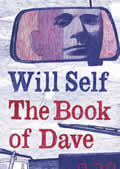
Will Self – The Book Of Dave
![]()
![]()
Synopsis
“The Book of Dave” is based around the rants of Dave Roth, a disgruntled East End taxi driver, who writes his woes down and buries them only to have them discovered 500 years later and used as the sacred text for a religion that has taken hold in the flooded remnants of London. Will Self’s big bold book dares to take on the grand themes in the grand manner. It is at once a profound meditation upon the nature of received religion; a love story; a caustic satire of contemporary urban life and a historical detective story set in the far future.
The Book Of Dave is published on June 1st 2006
Tough Tough Toys For Tough Tough Boys – SpikeMagazine.com review
Robert Clarke, April 1998
“In his new collection of short stories, Will Self once more welcomes us to the terrifyingly trenchant world of the literary recusant. With his usual irreverent wit and unrestrained surrealism, Tough Tough Toys For Tough Tough Boys sees Self move from the ridiculous to the downright absurd through a mixture of high art and low life, leaving in his wake a darkly satirical collage of contemporary fiction.”
- « Previous Page
- 1
- …
- 14
- 15
- 16
- 17
- 18
- …
- 22
- Next Page »
